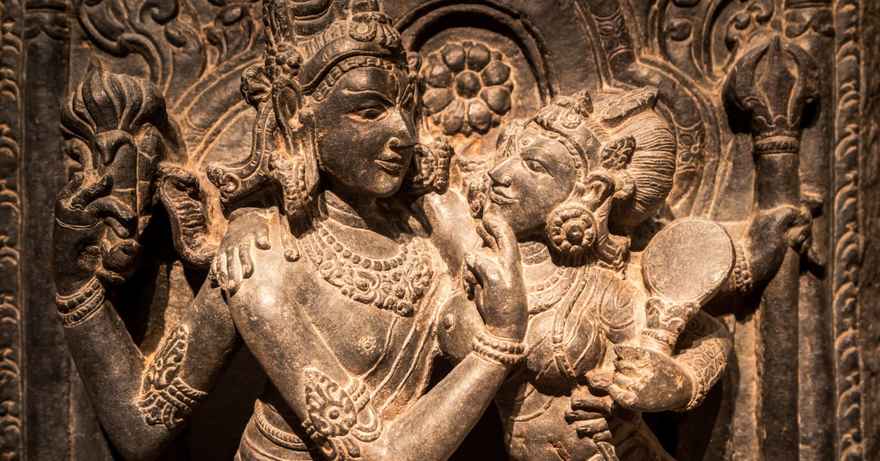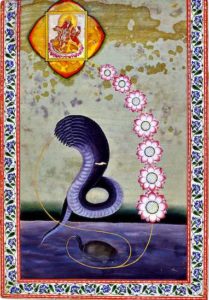Yoga of Mental Health Workshops → More Info
Tantra, the Science of Self–Transformation and Self–Realization

Tantra is the ancient empirical philosophy and science of liberating energy in order to expand consciousness and realize one's inherent spiritual power.
Consciousness and energy are united and made available for health, mental peace, emotional resilience, creativity, and spiritual realization. Tantra is a practical, empirical, and experiential science that lights the torch and shows the way to self-transformation through psychological, psychic, and spiritual growth and fulfillment.
Tantra and Yoga are intimately related. Many yogic techniques are used as part of tantric practice and ritual. Both yoga and tantra share the common goal of uniting our individual awareness with the highest Self.
Defining yoga-tantra
The word tantra is derived from the Sanskrit roots tan and tra. The root tan means extension, expansion, stretching, and pulling, like pulling rubber. Tra means to liberate, release, emancipate, and make free. Energy is liberated so that it can be united with consciousness.
Yoga means connection or union. In this context, it refers to techniques that enable the union of consciousness and energy, of Shiva and Shakti.
Yoga-tantra, therefore, is the "liberation of energy (trapped in matter and neurotic psychological patterns) to expand individual consciousness and unite it with universal consciousness."
Energy is often trapped in tensions, old unconscious habits, and patterns within the body-mind. We may feel small, powerless, and out of touch with our true Self.
Yoga-tantra provides the maps, techniques, rituals, and methods to liberate trapped energy.
A rich and diverse tradition
Tantra is a rich and diverse Indian philosophical tradition, a profound system of self-transformation that teaches liberation of the mind through the release of energy.
Tantra is both a philosophy and a ‘sādhana shāstra.’ ‘Sādhana’ means yogic or spiritual practice. ‘Shāstra’ is a text that instructs how to perform techniques for liberation.
Tantra is a systematic, scientific, and experimental method that offers the possibility of expanding our consciousness and faculties. Tantra also incorporates various sciences and systems into itself, including mathematics and physics, the nature of light and sound, atomic theory, space-time relationships, astronomy and astrology, the calendar and cosmology, alchemy, and their use in spiritual practice.
Tantra is a flexible, non-dogmatic tradition suitable for all
Tantra provides diverse methods to suit our individual needs according to our karma, nature (swabhāva), and abilities (adhikāra).
Tantra is not limited to any one group or sect. Indeed, many traditions have absorbed and accepted tantric practice into their philosophy or religion as a practical way to achieve a profound experience of the inner reality.
Part of Tantra's beauty lies in its ability to offer multiple methods and approaches for healing and self-transformation that can be incorporated into an individual's life, rather than just a single method or a dogma that demands we conform to a single "right" way of being. Tantra synthesizes spirit and matter, enabling us to achieve our fullest spiritual and material potential.
Renunciation, detachment, and asceticism are not part of tantric philosophy. Instead, tantra teaches the opposite: not a withdrawal from life but the fullest possible acceptance of our desires, feelings, and situations as human beings.
Tantra heals the dichotomy between the physical world and its inner spiritual reality, for the spiritual to a practitioner of tantra, a tantric, is not in conflict with desires and with the organic world but rather is concerned with its fulfillment.
Realizing the chakras through tantra
Tantra has revealed the theory of the psychic centers, the chakras, as a fundamental backbone of its practice. Various tantric traditions have elaborated on the chakras and devised visual and abstract symbols that map these centers and enable us to journey up or down them to gain material or spiritual experience.
The chakras are doorways into the universal, which can be accessed either through working directly on them, via kundalini yoga, through the performance of rites and rituals, or through the repetition of mantras, particularly seed mantras, and gazing at sacred images such as yantras, mandalas, and deities.
Tantra practices and techniques
Tantra is, above all, a very practical system that aims to produce defined results. Tantra provides us with simple techniques that we can perform daily, either as formal practices or applied to our daily lives for creative living. By practicing these techniques we can remove tensions and negative patterns, create joyful states of body-mind and awaken consciousness.
The main practices of tantra taught today are Yoga Nidra, the easiest and most accessible of all the tantric meditations, various chakra meditations, and the core yoga-tantra practice Ajapa Japa, which unites breath, mantra, and consciousness.
Big Shakti's yoga-tantra meditations and courses
Big Shakti is dedicated to the dissemination of yoga-tantra knowledge as a means to health, well-being, psychological growth, emotional resilience, and spiritual realization.
Of all the yoga-tantra techniques we teach, Ajapa Japa remains preeminent. Regular, accurate practice of this technique combined with theoretical understanding leads to physical and mental health and healing, and spiritual illumination.
You can learn both the technique and the theory of how to apply the technique in our course Healing the Mind - Ajapa Japa Stage 1. The course is a concise and complete introduction to Ajapa Japa, the King of meditations.
Categories
- Yoga Therapy (59)
- Meditation (33)
- Yoga Psychology (41)
- Consciousness (31)
- Everyday Wisdom (34)
- Yoga Nidra (14)
- Relaxation (26)
- Spirituality (26)
- Wisdom (6)
- Meditation Techniques (42)
- Prana - The subtle breath (16)
- Yoga Philosophy (27)
- Chakras (28)
- Yoga (15)
- Diseases (10)
- Yoga Meditation Research (5)
- Ayurveda (4)
- Third Eye - Ajna Chakra (7)
- Podcast (23)
- Articles by Jayne Stevenson (17)
- Articles by Swami Shankardev (25)
- Life Purpose (8)
- Yoga Tantra (20)
- Shadow Self (10)
- Symbols (3)
- Carl Jung (6)
- Mantras (19)
- e-mag (16)
- Mental Wellness (47)
- Stress Management (12)
- Emotion (3)
- Self-Awareness (1)
- Self-Regulation (2)
- Healing (3)
2025 Yoga of Mental Health Workshops
- Sāṁkhya Philosophy & Mental Health: A Yogic Path to Holistic Well-being
- Uncovering the Roots of Mental Illness: Insights from the Gita & Patanjali
- Restoring Self-Regulation: Yogic Techniques for Emotional Resilience & Inner Strength
- Mantra Therapy: Transforming Thought Patterns for Emotional Healing & Mental Wellbeing







